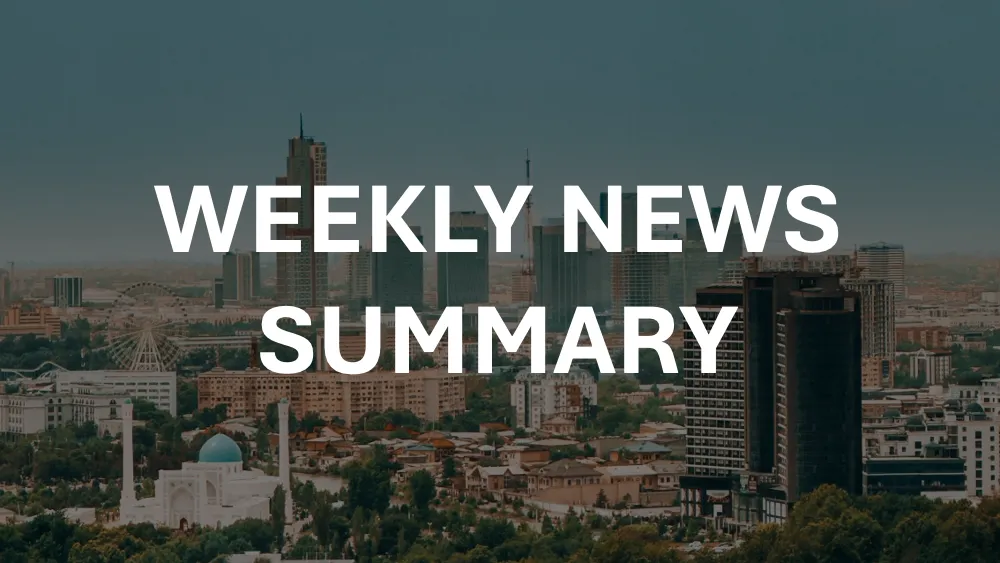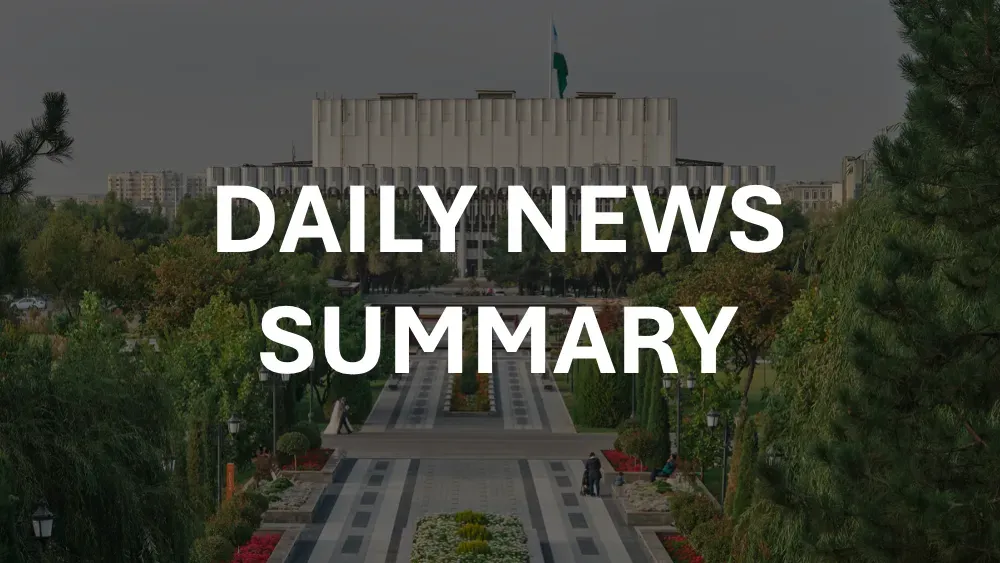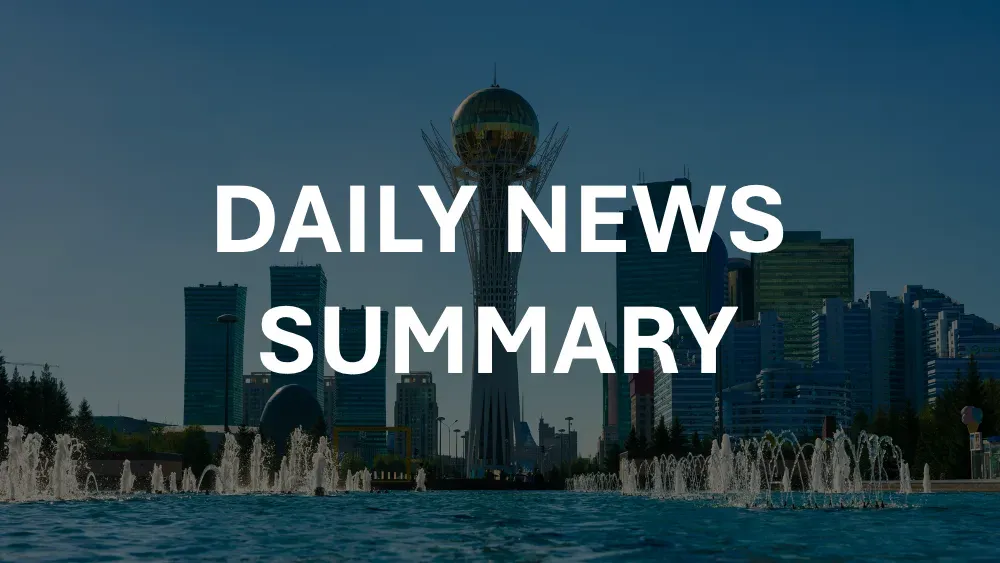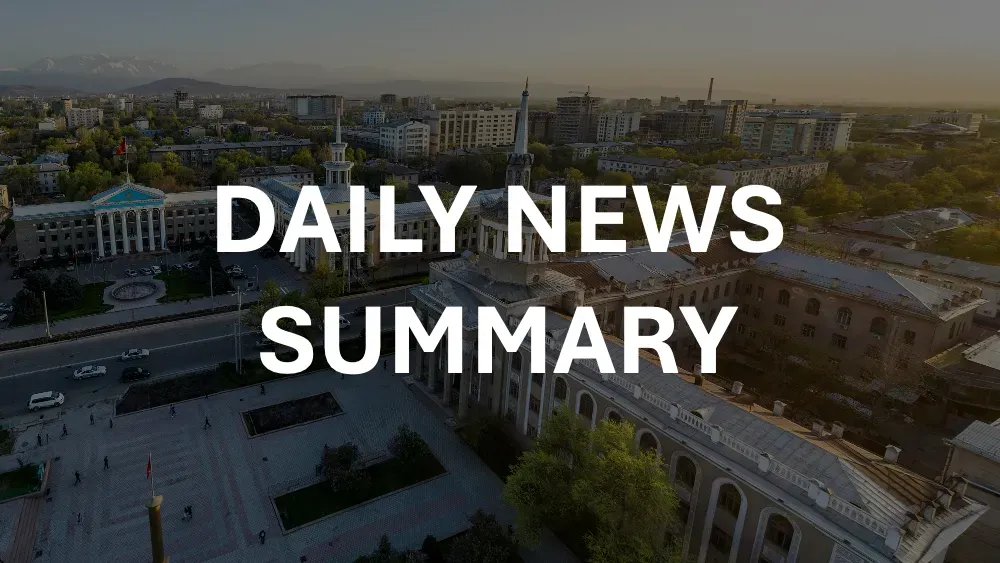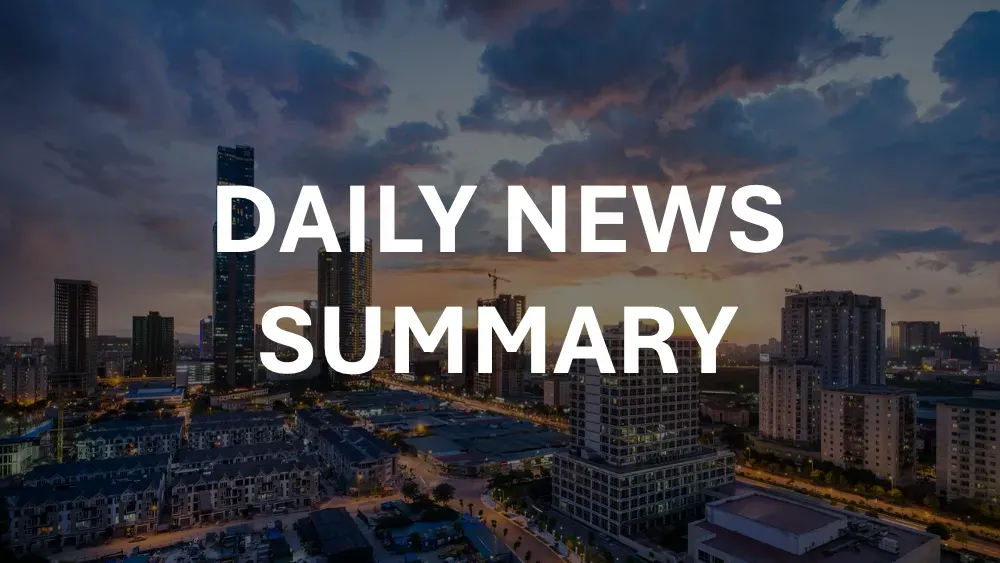This weekly digest showcases just 10 stories. Daily subscribers receive comprehensive intelligence briefs with 40 of the top stories organized by category. Don't miss the stories that matter.
Subscribe to Daily →
August 15, 2025 to August 21, 2025
This week's top 10 stories from Uzbekistan, selected from our daily intelligence briefs.
1. President Pledges Pro‑Business Overhaul with Tax Cuts, Tourism Push, and New Financing Tools
At an open dialogue with entrepreneurs in New Tashkent, President Shavkat Mirziyoyev unveiled a package of regulatory, tax and financing measures intended to accelerate private‑sector growth and exports, citing 7.2% GDP growth in H1 and that 1,000 business proposals have been incorporated into law since 2021. Key measures include a reduced 1% turnover tax for micro‑businesses from January, a moratorium on penalties for overdue export receivables through 2026, rollout of a universal QR mobile‑payment system from 1 November, an alternative credit‑scoring system from May 2026, and a new investment platform allowing non‑founder equity participation.
The government also targeted tourism and SME finance with land auctions for 5,000 hectares, soft loans and expanded subsidies for hotels (including a $1 million annual hotel award), and a decree channeling 270 trillion soums to SME financing and industrial infrastructure for 2026–2027. For international professionals, these measures signal continued liberalization and state support to boost formalization, digital payments and private capital mobilization—steps likely to improve credit access and export liquidity but that will require implementation oversight to realize investor confidence and measurable productivity gains.
From daily brief: 2025-08-21
2. Enhanced Partnership Agreement with EU Targeted for Signing in Coming Months
Uzbekistan President Shavkat Mirziyoyev announced that Tashkent aims to sign an Enhanced Partnership and Cooperation Agreement (EPCA) with the European Union "in the coming months," framing the deal as a central element of a broader strategy to deepen political dialogue, trade, investment and sectoral cooperation with Europe. Mirziyoyev identified Azerbaijan as a strategic bridge for re‑establishing East–West transport, logistics and energy corridors across the Caspian route, and said Uzbekistan is working with EU partners to develop these transcontinental links.
If concluded, the EPCA would advance Uzbekistan’s market diversification and infrastructure connectivity objectives by formalizing cooperation on customs, transport and energy projects that could increase flows across the Caspian corridor. The announcement signals accelerating diplomatic and economic engagement with the EU and regional partners, and could materially affect project timelines and investment planning for logistics and energy stakeholders operating between Central Asia and Europe.
From daily brief: 2025-08-20
3. Tashkent Backs Baku as Strategic Bridge Linking Central Asia to Europe, Eyes Expanded EU Pact
At a high-level forum on “Uzbekistan, Azerbaijan and Europe,” President Shavkat Mirziyoyev cast Azerbaijan as a strategic bridge between Central Asia and Europe and signaled Tashkent’s intent to deepen ties with the EU. Mirziyoyev said Uzbekistan will sign an Enhanced Partnership and Cooperation Agreement (EPCA) with the European Union “in the coming months,” and highlighted joint work on transport and energy corridors to restore the region’s role as a Eurasian hub.
Mirziyoyev praised Azerbaijani President Ilham Aliyev’s willingness to advance interregional initiatives and welcomed Baku’s role in a Washington-brokered trilateral Joint Declaration with Armenia, framing such diplomacy as facilitating South Caucasus–Central Asia connectivity. For international professionals, the comments underscore coordinated Uzbek–Azerbaijani efforts to leverage logistics and energy linkages for trade diversification and geopolitical influence, while the impending EPCA could mark a substantive institutional deepening of Tashkent–Brussels relations.
From daily brief: 2025-08-19
4. Four Cross-Border Power Projects Agreed to Upgrade Uzbekistan–Afghanistan Grid Links
Uzbekistan and Afghanistan have signed contracts for four cross-border transmission projects to strengthen grid links and collective reliability following a July 3 meeting between Uzbekistan President Shavkat Mirziyoyev and Taliban Deputy Prime Minister Mullah Abdul Ghani Baradar in Khankendi, Azerbaijan. The package covers a 200.6 km, 500 kV Surkhan–Pul-e Khumri line with expansion of Khoja Alvan substation; an upgrade of Argandab substation to 500/220 kV and 800 MVA; a new 125 km dual-circuit 220 kV line from Butkhak (Kabul) to Shaykh Mesri (Nangarhar); and a 220 kV Shaykh Mesri substation (2×25 MVA and 2×40 MVA). Groundbreaking is planned in Kabul during the International Energy Conference on September 6–7, with completion targeted by Q1 2027.
Beyond hardware, the agreement emphasizes local content, digitized settlements, network modernization and workforce training, signalling a systems-level partnership aimed at securing electricity trade and operational reliability between the countries. For international energy professionals, the projects represent a sizeable, time-bound regional integration effort (notably the 500 kV and 220 kV corridors and 800 MVA capacity upgrade) that could materially shift Afghanistan’s import capacity and regional power-market dynamics if delivered on schedule.
From daily brief: 2025-08-20
5. Trans-Afghan Railway Proposal Weighed for Feasibility and Regional Payoffs
Uzbekistan, Afghanistan and Pakistan are exploring a Trans‑Afghan rail corridor that would link Central Asia to South Asia, positioning Uzbekistan to export via Pakistani ports to the Indian Ocean and shorten transit times compared with northern routes. Advocates say the line could diversify export corridors, lower freight costs and stimulate logistics and industrial hubs along the route, but progress hinges on resolving routing, track gauge and tariff access to ensure commercial viability.
Major obstacles are security and political stability in Afghanistan, unclear financing and risk-sharing among governments and lenders, technical interoperability and harmonised customs/sanitary procedures at borders. No binding agreements or funding commitments have been announced; timelines remain uncertain as stakeholders negotiate technical standards, access terms and investment arrangements.
From daily brief: 2025-08-19
6. Navoiy Mining Plans London–Tashkent Dual Listing to Reach $20 Billion Valuation
Navoiy Mining and Metallurgical Combinat (NMMC) plans to launch an initial public offering this year, floating 10–15% of shares via a dual listing on the London Stock Exchange and the Tashkent Stock Exchange, targeting an enterprise valuation around $20 billion (including debt), according to Bloomberg. Citi, Morgan Stanley and JPMorgan have been appointed as lead partner banks, and the move seeks to capitalise on record-high gold prices and offer international investors exposure to one of Central Asia’s largest gold producers.
Beyond immediate fundraising, the transaction is being positioned as a test case for deeper capital‑market integration in Uzbekistan: a successful sale could set a benchmark for future privatizations, improve price discovery for domestic listings and bolster reforms designed to attract foreign capital. The timing, bank roster and proposed dual listing underscore the government’s intent to signal market openness to global investors while monetising state assets.
From daily brief: 2025-08-17
7. Sojitz to Invest $200M in New Tashkent International Airport as Part of $1B Uzbekistan Portfolio
Japan’s Sojitz Corporation has committed $200 million to the planned new Tashkent International Airport, part of a broader $1 billion investment pipeline in Uzbekistan covering power (including the Sirdaryo-2 project), a 1 GW wind farm, and a Samarkand medical center. Uzbek authorities aim to commission the airport by 2030 with an initial capacity of up to 20 million passengers annually to relieve current airport constraints; government analyses warn a decade-long delay could cost the economy $8.6 billion in GDP and undermine ambitions to become a regional aviation hub.
The deal underscores sustained Japanese strategic engagement—Sojitz’s local presence and a formal cooperation roadmap with Tashkent—and keeps site options (including Orta Chirchiq district) under review. For international investors and infrastructure planners, the commitment signals momentum for large-scale transport and energy projects in Uzbekistan, while timelines and site selections will be critical to realizing projected traffic and economic benefits.
From daily brief: 2025-08-21
8. Renewables Gain Ground with Record Output, New Storage and Export Corridor Plans
Uzbekistan reported a rapid scale-up in renewables, saying clean sources supplied 30% of electricity and hit a record monthly output of 1.246 billion kWh in July 2024. Generation capacity has grown 50% since 2019 to 25 GW, including roughly 4 GW of solar and wind and 300 MW of storage today; authorities plan 3.5 GW of additional renewables and 1.8 GW of storage in 2025 and target 54% renewables by 2030. The country now operates 11 solar and four wind plants and has expanded small-scale installations to 129,826 sites (1.65 GW) through duty- and VAT-free imports, net metering and concessional loans.
Officials are pitching Uzbekistan as a regional green-energy hub, proposing a trilateral “Green Corridor” with Kazakhstan and Azerbaijan to export clean power toward Europe. The initiative, highlighted by Furqat Qurbonov of the Energy Ministry, signals growing policy emphasis on both domestic decarbonization and energy export revenues, with near-term capacity additions and cross-border transmission plans central to that strategy.
From daily brief: 2025-08-17
9. Investment Code Planned as New Platform Opens Direct Funding Channel for Businesses
Uzbekistan plans to consolidate fragmented investment rules into a single Investment Code after President Shavkat Mirziyoyev’s dialogue with entrepreneurs, aiming to unify guarantees, procedures and investor protections to improve the business climate and attract capital. The president said “It is time to combine all documents into a single, directly applicable law,” and authorities expect the reform to streamline approvals and spur inflows that underpin growth.
Concurrently, a state-backed investment platform will let companies directly raise funds from investors without adding them as LLC shareholders, shifting some financing away from banks and targeting about $1 billion in mobilized capital annually. The package—announced in August 2025—also includes tax incentives, VAT refunds for sales and open-banking measures to boost startup financing, signaling a coordinated policy push to deepen Uzbekistan’s private financing channels and stimulate entrepreneurship.
From daily brief: 2025-08-21
10. Sojitz Plans $1 Billion Push into Energy, Healthcare, and Airports with Uzbekistan PPPs
Japan’s Sojitz Corporation announced plans to invest approximately $1 billion in Uzbekistan across energy, healthcare and transport, part of a broader project pipeline it values at $5 billion. Key projects include a 1,573 MW gas-fired Syrdarya-2 plant (initial allocation ~$40 million), a 1 GW wind farm in Navoi (initial allocation ~$180 million), a public–private partnership hospital in Samarkand (initial allocation ~$75 million), and airport development projects (initial allocation ~$200 million). Sojitz President Kosuki Uemura cited Uzbekistan’s policy openness and investor protections after recent talks with government ministries.
The move underscores Sojitz’s long-term strategic commitment—having operated in Uzbekistan for three decades and opened a Tashkent office in 2004—and signals growing Japanese private-sector engagement in Central Asian infrastructure. For international investors and policymakers, the combination of large-scale energy capacity additions, healthcare PPPs, and airport upgrades highlights opportunities and geopolitical relevance as Uzbekistan seeks rapid development and diversified foreign investment.
From daily brief: 2025-08-20
These weekly highlights are a small sample of what's happening. Daily subscribers get comprehensive briefings with 40 top stories that connect the dots between events, track developing stories, and provide the context you need for informed decision-making.
Upgrade to Daily →
